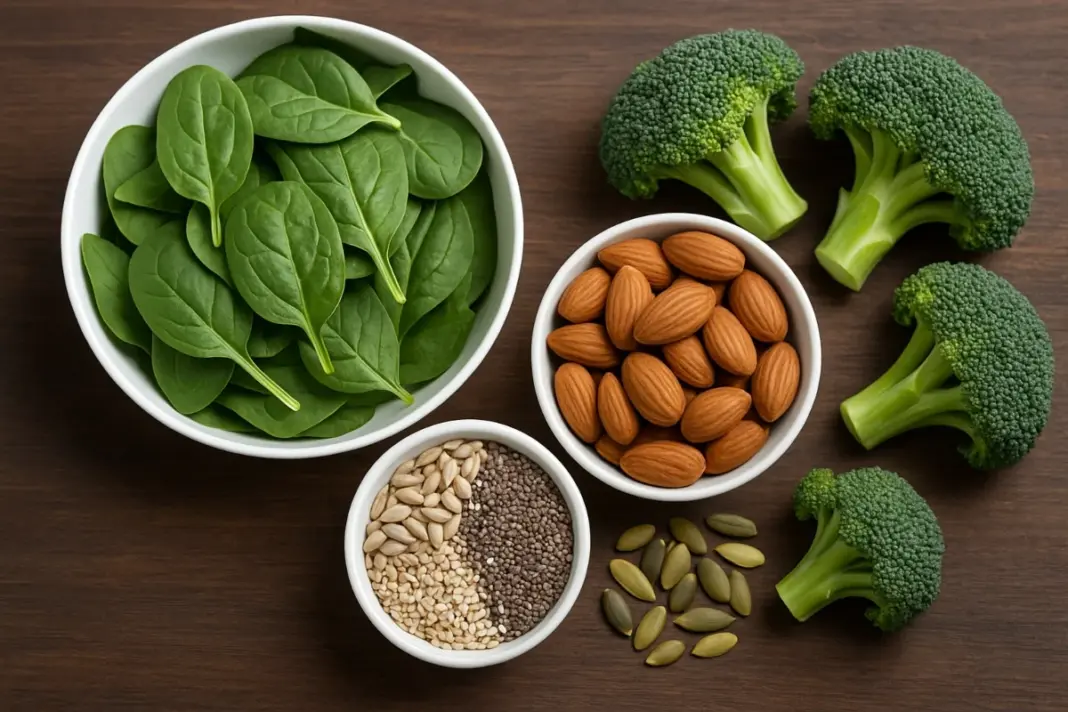Menopause marks a new chapter when monthly periods stop, usually between the ages of 45 and 55. This natural transition signals the end of reproductive years, often accompanied by hot flashes and mood swings.
Dieting for menopause is crucial now, helping ease symptoms and support overall health during this unique journey. Understanding menopause and when it begins is key to managing it well.
Smart Foods To Include For A Balanced Menopause Journey
A well-chosen diet for menopause is vital in managing symptoms like mood swings and hot flashes. Health coach Shivangi Desai highlights that eating right also supports weight control, heart health, and bone strength, making this phase more manageable.
- Calcium-rich foods help combat bone density loss associated with declining estrogen levels. Including green leafy vegetables such as spinach is key to joint and bone health.
- Nuts like almonds provide essential nutrients that support heart health and overall wellness.
- Seeds such as sunflower, chia, and sesame provide beneficial fats and minerals that support hormonal balance.
These foods compose a practical menopause food list to ease symptoms and promote long-term health.
Key Foods To Avoid For Easier Hormonal Balance Daily
Avoiding certain trigger foods makes maintaining daily hormone balance much easier. When you cut back on items that spike blood sugar, inflame the body, or disrupt sleep, your meals start working with your hormones, not against them—reducing mood swings, cravings, bloating, and overall discomfort.
- Highly processed foods like potato chips and fried snacks increase inflammation and disrupt hormone function.
- Excess caffeine and alcohol intake can disturb sleep cycles and raise stress hormones, worsening menopause symptoms.
- Sugary foods and artificial sweeteners lead to blood sugar spikes and hormonal imbalance, impairing overall health.
Choosing foods to avoid during menopause thoughtfully can help smooth the often choppy hormonal ride.
Simple Daily Habits Supporting A Healthier Diet For Menopause
Simple daily habits act like support pillars for a healthy menopause diet, making every food choice more effective. From how often you eat and drink to how you sleep, move, and manage stress, these routines work together to stabilise hormones, reduce discomfort, and protect long-term health.
- Staying hydrated and eating regularly helps maintain energy and hormone stability.
- Prioritising sleep and managing stress supports hormonal health alongside dietary efforts.
- Incorporating physical activity fosters weight management and improves mood, complementing the diet for menopause.
Together, these habits build a lifestyle that supports hormonal balance and wellbeing. Adopting a mindful diet for menopause and avoiding disruptive foods can greatly ease this transition. Simple, consistent habits enhance hormonal harmony, leading to better health and comfort.
Disclaimer: This content, including advice, provides general information only. It is not a substitute for a qualified medical opinion in any way. The methods and claims mentioned in this article should be considered as suggestions only; DNP India neither confirms nor denies them. Always consult a doctor before following any such suggestions/treatments/medications/diets.


